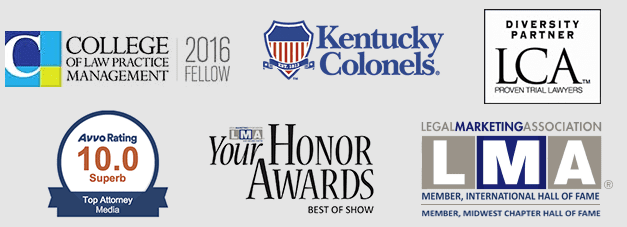It’s a minefield. Let’s be careful out there.
As legal marketing continues to evolve, it’s important for legal marketers to be aware of the ethical considerations involved in promoting law firms and legal services. Failure to abide by the ABA Model Rules of Professional Conduct can result in significant consequences, including disbarment, fines, and loss of reputation.
In this article, we’ll outline 25 marketing-ethics mistakes that legal marketers should avoid, along with the related ABA Model Rule. Check your state’s rules for their application to your particular firm.
- Failing to Maintain Client Confidentiality: Rule 1.6 prohibits lawyers and legal marketers from disclosing confidential client information in their marketing materials.

- Making Misleading Claims: Rule 7.1 prohibits lawyers and legal marketers from making false or misleading claims in their advertising or marketing materials, even by omission.
- Failing to Avoid Deceptive Trade Practices: Rule 8.4(c) prohibits lawyers and legal marketers from engaging in conduct involving dishonesty, fraud, deceit, or misrepresentation. This should be an easy one to follow.
- Using Non-Lawyer Personnel for Marketing: Rule 5.3 prohibits lawyers from allowing non-lawyer personnel to engage in marketing activities that would be prohibited if the lawyer engaged in them.
- Failing to Maintain the Integrity of the Profession: Rule 8.4(d) prohibits lawyers and legal marketers from engaging in conduct that adversely reflects on their fitness to practice law or undermines the integrity of the legal profession.
- Engaging in Prohibited Solicitation: Rule 7.3 prohibits lawyers and legal marketers from engaging in prohibited solicitation activities, such as in-person or live telephone solicitation with prospects with whom we do not have an existing relationship.
- Misrepresenting the Qualifications of the Firm or Lawyers: Rule 7.1 prohibits lawyers and legal marketers from making misleading claims about the qualifications or experience of the firm or its lawyers.
- Creating False Expectations: Rule 7.1 prohibits lawyers and legal marketers from creating false expectations about the results they can achieve for clients.
- Using Confidential Client Information Without Consent: Rule 1.9 prohibits lawyers and legal marketers from using confidential client information for their own benefit without client consent. This includes case studies on the firm’s website.
- Failing to Comply with Bar Advertising Regulations: Rule 7.5 sets out specific restrictions on lawyer advertising, such as prohibiting the use of trade names that are misleading or imply a connection with a government agency.
- Failing to Comply with Social Media Guidelines: Rule 7.1 also applies to legal marketers’ use of social media, requiring them to comply with the same ethical guidelines as any other form of advertising.
- Failing to Disclose Compensation Arrangements: Rule 1.5(b) requires lawyers to disclose the scope of representation and basis or rate of the fee and expenses in their marketing materials.
- Failing to Disclose Material Limitations: Rule 7.1 requires lawyers and legal marketers to disclose material limitations in their advertising or marketing materials.
- Failing to Disclose Client Testimonials: Rule 7.1 requires lawyers and legal marketers to disclose any material connection between the client and the lawyer or law firm in client testimonials.
- Failing to Avoid Conflicts of Interest: Rule 1.7 requires lawyers and legal marketers to avoid conflicts of interest in their marketing activities.
- Failing to Avoid Improper Influence: Rule 5.4 prohibits lawyers from sharing fees with non-lawyers, which can include legal marketers.
- Failing to Avoid Interference with Administration of Justice: Rule 8.4(d) prohibits lawyers and legal marketers from engaging in conduct that interferes with the administration of justice.
- Failing to Use Disclaimers: Rule 7.1 requires lawyers and legal marketers to use disclaimers when necessary to avoid misleading clients.
- Failing to Maintain Competence: Rule 1.1 requires lawyers and legal marketers to maintain competence in their marketing activities, including staying up-to-date on relevant laws and regulations.
- Failing to Avoid Discrimination: Rule 8.4(g) prohibits lawyers and legal marketers from engaging in discrimination or harassment in their marketing activities.
- Failing to Avoid Undue Influence: Rule 5.6 prohibits lawyers from participating in agreements that restrict their ability to practice law, including their agreements with legal marketers. This one doesn’t come up very often.
- Failing to Comply with State Bar Regulations: In addition to the ABA Model Rules, legal marketers must also comply with state bar regulations, which can vary by jurisdiction.
- Failing to Avoid Confusing Clients: Rule 7.1 prohibits lawyers and legal marketers from using language that is likely to confuse potential clients.
- Failing to Avoid Unsubstantiated Claims: Rule 7.1 requires lawyers and legal marketers to have a reasonable basis for any claims they make in their advertising or marketing materials.
- Failing to Comply with Data Privacy Laws: Legal marketers must also comply with data privacy laws, such as the General Data Protection Regulation (GDPR) in the European Union, when collecting and using personal data for marketing purposes.
In conclusion, legal marketers must be vigilant in their marketing activities to ensure that they are complying with ethical guidelines and regulations. Failure to do so can result in serious consequences for both the legal marketer and the law firm they represent. By staying up to date on relevant rules and regulations, legal marketers can ensure that their marketing efforts are ethical, effective, and in compliance with the law.
Need a new advertisement, brand, or website?
Contact Ross now at: ross [at] fishmanmarketing.com or +1.847.921.7677.
Download a free copy of his best-selling strategy and branding book, “We’re Smart. We’re Old. And We’re the Best at Everything.” here or buy an actual book on Amazon here.
Do your lawyers need marketing training or a dynamic speaker at a firm retreat, either live or via webinar? Ross is one of the legal profession’s most-popular marketing and CLE presenters. Here’s a link to a video of Ross in action.

